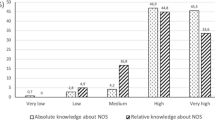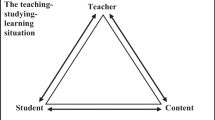Abstract
This mixed methods study explored how Saudi Arabia’s science education reform is functioning in 2 public girls’ secondary schools located in Dammam, 1 of the main cities in Saudi Arabia. Saudi Arabia recently launched a new initiative to promote science education innovation by providing science curriculum change, professional development for science teachers, and progress towards a new educational system. This study examined Saudi secondary girls’ perceptions regarding science learning environments and the metacognitive science learning orientation within the context of science education reform in Saudi Arabia (N = 202). Further, 3 science teacher participants were interviewed in order to ascertain their perceptions of their current science teaching environments and their science teaching. Particular emphasis was placed on examining differences between the Course System, which is a new system designed to facilitate science experiments and constructivist teaching and learning, and the regular system in terms of students’ perceptions about science learning environments and their metacognitive science learning orientation. Results and findings indicate that teachers supported the constructivist pedagogy, and science education reform efforts may gradually change Saudi science education environments and improve Saudi girls’ science metacognitive learning orientation.


Similar content being viewed by others
References
Albadi, N., O’Toole, J., & Harkins, J. (2017). A preliminary study of the technical use of Arabic in Saudi secondary physics classes. Issues in Educational Research, 27(4), 639–657.
Aldridge, J. M., Laugksch, R. C., Seopa, M. A., & Frase, B. J. (2006). Development and validation of an instrument to monitor the implementation of outcomes-based learning environments in science classrooms in South Africa. International Journal of Science Education, 28(1), 45–70.
AlGhamdi, R. (2017). Science and physics for Saudi girls: Their perceptions, motivations and career perspectives (Unpublished doctoral dissertation). Curtin University, Perth, Australia.
Alhammad, K. (2015). A conceptual framework for re-shaping science education in Saudi Arabia. In N. Mansour & S. Al-Shamrani (Eds.), Science education in the Arab gulf states (pp. 121–136). Rotterdam: Sense.
Alhareth, Y., Al Dighrir, I., & Al Alhareth, Y. (2015). Review of women’s higher education in Saudi Arabia. American Journal of Educational Research, 3(1), 10–15.
Alrushaid, W. (2010). Strengthening of national capacities for national development strategies and their management: An evaluation of UNDP’s contribution. Riyadh: UNDP.
Alshmemri, M. S. (2014). Job satisfaction of Saudi nurses working in Saudi Arabian public hospitals (Unpublished doctoral dissertation). Royal Melbourne Institute of Technology, Melbourne, Australia..
Alsuwaida, N. (2016). Women’s education in Saudi Arabia. Journal of International Education Research, 12(4), 111–118.
Alturki, N. (2016). Inquiry and teacher education in the Kingdom of Saudi Arabia (Unpublished doctoral dissertation). University of Arizona, Tucson, AZ.
Alzahrani, S. (2012). Identifying the attributes of success of Saudi female entrepreneurs in garment production: An exploratory study conducted in Saudi Arabia. (Unpublished master’s thesis). Kansas State University, Manhattan, NY.
Cavacini, A. (2016). Recent trends in Middle Eastern scientific production. Scientometrics, 109(1), 423–432.
El-Deghaidy, H., Mansour, N., & Alshamrani, S. (2015). Science teachers’ typology of CBD activities: A socio-constructivist perspective. International Journal of Science and Mathematics Education, 13(6), 1539–1566.
Ernest, P. (1995). The one and the many. In J. Stel’fe & J. Gale (Eds.), Constructivism in education (pp. 459–486). Hillsdale: Erlbaum.
Faiz, M. (2002). Theoretical background proposed for educational research in teaching mathematics. Proceedings of the 2002 Conference of the Assembly of Research in Mathematics Education (pp. 15–22). Cairo: Ain Shams University.
Freire, P. (2003). Pedagogy of the oppressed. New York: Continuum.
Hamdan, A. (2005). Women and education in Saudi Arabia: Challenges and achievements. International Education Journal, 6(1), 42–64.
Hamdan, A. (2006). Arab women's education and gender perceptions: An insider analysis. Journal of International Women's Studies, 8(1), 52–64.
Hamdan, A., & Al-Salouli, M. (2013). Saudi elementary school science teachers' beliefs about teaching science in the new millennium. International Journal of Science and Mathematics Education, 11(2), 501–525.
Hamdan, A. (2014). Factors influencing Saudi female students studying science and working in science fields. Bort Said Education Journal, 15(1), 24–50 [In Arabic].
Hamdan, A., & Hassan, N. (In Press). Course system impact on the development of metacognitive thinking skills among high school students in Dammam. Journal of Alquds Open University for Psychological and Educational Studies [In Arabic].
Honebein, P. (1996). Seven goals for the design of constructivist learning environments. In B. Wilson (Ed.), Constructivist learning environments (pp. 11–24). Englewood Cliffs: Educational Technology.
Jamjoom, F. B., & Kelly, P. (2013). Higher education for women in the Kingdom of Saudi Arabia. In P. Maassen & J. Muller (Eds.), Higher education in Saudi Arabia: Achievements, challenges and opportunities (pp. 117–125). New York: Routledge.
King Abdullah University of Science and Technology (2018). Vision and mission. Retrieved from https://www.kaust.edu.sa/en/about/vision. Accessed 18 Jan 2018.
Mansour, N., & Al-Shamrani, S. (2015). The context of science education in the Arab Gulf States. In N. Mansour & S. Al-Shamrani (Eds.), Science education in the Arab gulf states (pp. xiii–xxxi). Rotterdam: Sense.
Mansour, N., Alshamrani, S., Aldahmash, A., & Alqudah, B. (2013). Saudi Arabian science teachers and supervisors’ views of professional development needs. Eurasian Journal of Educational Research, 51(1), 1–27.
Mills, A. (2009). Reforms to women’s education make slow progress in Saudi Arabia. The Chronicle of Higher Education, 55(43), 11–15.
Ministry of Education (2018). Guide to secondary education. Retrieved from http://trc.t4edu.com/Home/index. Accessed 22 Jan 2018.
Mullis, I. V. S., Martin, M. O., & Foy, P. (2008). TIMSS 2007 international science report: Findings from IEA’s trends in international mathematics and science study at the fourth and eighth grades. Chestnut Hill: TIMSS & PIRLS International Study Center, Boston College.
National Center for Education Statistics (n.d.). Trends in international mathematics and science study (TIMSS). Retrieved on March 5, 2017, from https://nces.ed.gov/timss/.
Pamuk, S., Sungur, S., & Oztekin, C. (2016). A multilevel analysis of students’ science achievements in relation to their self-regulation, epistemological beliefs, learning environment perceptions, and teachers’ personal characteristics. International Journal of Science and Mathematics Education, 15(8), 1423–1440.
Pasha-Zaidi, N., & Afari, E. (2016). Gender in STEM education: An exploratory study of student perceptions of math and science instructors in the United Arab Emirates. International Journal of Science and Mathematical Education, 14(7), 1215–1231.
Smith, L., & Abouammoh, A. (Eds.). (2013). Higher education in Saudi Arabia: Achievement, challenges and opportunities. New York: Springer.
Tatweer (2014a). T4EDU math and science teacher development programme expected to have positive impact on math and science education in Saudi Arabia [Pearson’s press release]. Retrieved from https://qualifications.pearson.com/en/news-policy/press-releases/2014/t4edu-maths-and-science-teacher-development-programme-is-expected-to-have-positive-impact-on-education-in-saudi-arabia.html. Accessed 20 Aug 2015.
Tatweer. (2014b). Preliminary scope of work: Project to manage the teacher professional learning abroad program. Riyadh: Tatweer for Educational Services.
Taylor, C., & Albasri, W. (2014). The impact of Saudi Arabia king Abdullah’s scholarship program in the US. Open Journal of Social Sciences, 2(10), 109–118.
Thomas, G., Anderson, D., & Nashon, S. (2008). Development of an instrument designed to investigate elements of science students’ metacognition, self-efficacy and learning processes: The SEMLI-S. International Journal of Science Education, 30(13), 1701–1724.
UNESCO. (2013). Education for all global monitoring report. Paris: Author.
Veenman, M. V., Van Hout-Wolters, B. H., & Afflerbach, P. (2006). Metacognition and learning: Conceptual and methodological considerations. Metacognition and Learning, 1(1), 3–14.
Yizraeli, S. (2012). Politics and society in Saudi Arabia. The crucial years of development, 1960-1982. New York: Columbia University Press.
Funding
This study was supported by the research fund from Chosun University, 2017.
Author information
Authors and Affiliations
Corresponding author
Appendix. Teacher interview questions
Appendix. Teacher interview questions
-
1.
What do you think of students’ involvement in your science class?
-
2.
What do you think of students’ investigation in your science class?
-
3.
What do you think of students’ cooperation in your science class?
-
4.
What do you think of equity in your science class?
-
5.
What do you think of differentiation in your science class?
-
6.
What do you think of personal relevance in your science class?
-
7.
What do you think of students’ responsibility for their learning?
-
8.
Could you describe your science class? How do you usually teach (teaching methods)? In your class, what do you think about how students learn?
-
9.
How do you evaluate the Course System?
Rights and permissions
About this article
Cite this article
Kim, S.Y., Hamdan Alghamdi, A.K. Female Secondary Students’ and Their Teachers’ Perceptions of Science Learning Environments Within the Context of Science Education Reform in Saudi Arabia. Int J of Sci and Math Educ 17, 1475–1496 (2019). https://doi.org/10.1007/s10763-018-09946-z
Received:
Accepted:
Published:
Issue Date:
DOI: https://doi.org/10.1007/s10763-018-09946-z




